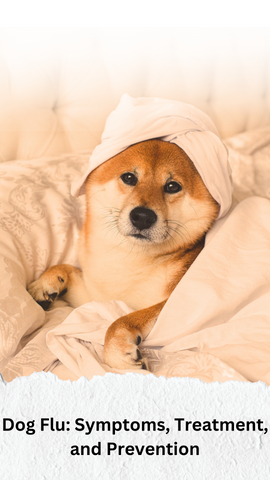
Canine flu, or dog flu, is a contagious illness affecting dogs. While it's typically not fatal, it can cause your dog to feel quite unwell.
This illness doesn't discriminate—it can affect any dog, regardless of age, breed, or health status. In certain situations, it could even affect cats. Unlike some viruses that are more common during certain times of the year, dog flu can strike at any time.
The silver lining is that experts haven't observed this flu spreading to humans. Nevertheless, it's crucial to understand the risks if you share your life with a furry companion.
Dog Flu Symptoms
Symptoms of dog flu may resemble those of kennel cough, which is another respiratory illness in dogs. These signs include:
- Cough
- Fever
- Decreased appetite
- Runny nose
- Sleepiness
- Discharge from the eyes
Sometimes, your pet might not show any signs of illness. However, in rare cases, they could get really ill. This could result in pneumonia or, in extreme cases, even death. Fortunately, the number of dogs that pass away from dog flu is quite low.
If you suspect your pet might have dog flu or an infection caused by it, you should contact your veterinarian for advice and assistance.
Is Dog Flu Contagious?
The chance of humans getting sick from dog flu is tiny. Even though there haven't been any cases of people getting dog flu, the Centers for Disease Control and Prevention (CDC) says that flu viruses can change over time. This means dog flu could affect humans one day.
The World Health Organization (WHO) monitors any virus changes that could affect humans. Thankfully, for now, dog flu isn't something people need to worry about.
Treatment Of Dog Flu
Treating the flu in dogs involves providing supportive care to help them feel better. This might include:
Supportive Therapy:
We give fluids through a vein (IV fluids) to help circulation, reduce fever, and keep them hydrated. We provide oxygen through a mask or chamber to help with breathing.
Medication:
Your vet might prescribe NSAIDs to lower fever and ease discomfort or steroids to help with breathing and inflammation. They won't give these medicines together. Sometimes, your vet may also prescribe antimicrobials to fight off any bacterial infections.
Observation:
If your dog is very sick or not responding well to treatment, your vet might suggest they stay at the clinic for a while so they can keep an eye on them closely.
Prevention Of Dog Flu
Preventing the spread of dog flu is super important because it's contagious. Here are some steps you can take:
Vaccinate your dog:
Vaccinating your dog is one of the best ways to protect them from dog flu. Talk to your vet about this when you go in for regular vaccinations.
Wash your hands:
Even though people can't get dog flu, they can still spread it to other dogs by touching them. Ensure you wash your hands well after petting or playing with other dogs.
Keep your dog separate:
If your dog seems sick with flu-like symptoms, it's best to keep it away from other dogs until it's better. This helps prevent the virus from spreading.
Most dogs can get better from dog flu with proper care and medical attention. If you think your dog might have it, it's a good idea to take them to the vet as soon as possible.






